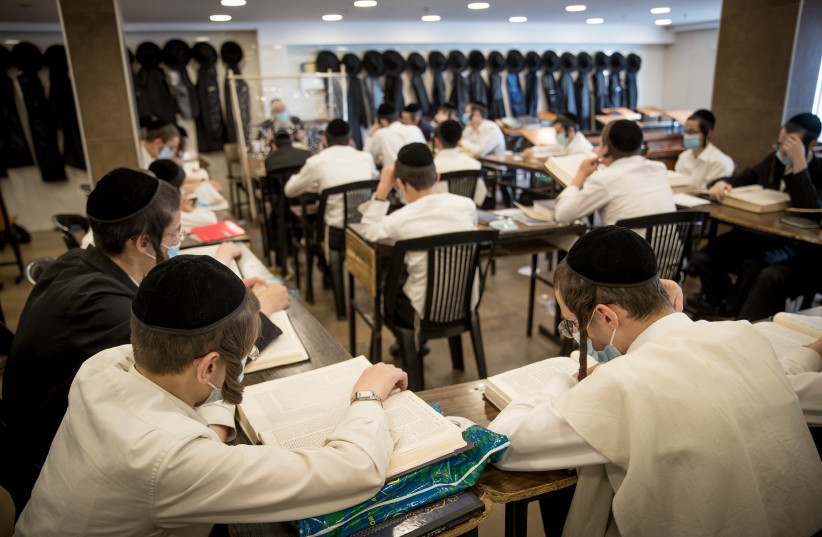After almost 20 years of being in the classroom I still love teaching. The reason I love teaching is that I have the privilege of teaching Judaism in Jerusalem to college freshmen spending their gap year in yeshivot and seminaries.
Judaism for me is the greatest idea in the history of the world and the opportunity to share that idea with my students whom I see as my extended family, is a powerful and electric experience for me. While I am aware of how much of a cliché this sounds, I really do look at each of my students as a younger brother or sister. I actually care about them and cheer for them as they make their way in this world.
My own Jewish take on things is quite simple. I really believe that at least one of the following must be true:
Either there is a God who takes an active role in this world, the same one that made a covenant with Abraham almost 4000 years ago, pledging we would be for Him a people and He would be for us a God. It cast a special role for us – Abraham’s children. It comes with special obligations and burdens, but grants the gift of eternity to its adherents.
Or, perhaps there is no God. God never made this covenant, which was merely a fiction created by a tribe of desert nomads, a group of religious geniuses who stumbled upon a narrative, theology, and system of rituals that have preserved them as a distinct and separate people for close to four millennia. And in their distinction they have enriched the world through philosophy, science, math, ethics, medicine, theology, literature, physics, astronomy, and the arts.
Either way, I want to be on ‘Team Jew.’ Team Jew is a formula for morality, ethics, and eternity.
I remember reading once that a great philosopher pointed out, almost as a moral condemnation, that those Jews who did not convert to Christianity in the 19th century and remained steadfast in their Jewish identity and observance damned their progeny to be murdered in the Holocaust. My immediate reaction was to be troubled by that thought, until a second later I realized that the philosopher got it all wrong.
While those Jews who did not convert did have their descendants murdered in the Holocaust; those that did convert and assimilated to become Christian Europeans damned their children to be the murderers! Between the two options, I think the choice is clear.
As for an educational method, I find too many teachers use a top-down approach. They walk into the classroom with an agenda. The agenda might be to dictate his or her own way of thinking to a student. Or the agenda may be to drill the subject or course into the head of the student. I fear there are too many teachers of Judaism that feel they “have the truth” and it is their job to convince their students of that same truth.
When I enter a classroom, my first thought is how can I share my excitement about Judaism in a way that will be as exciting for a teenager as it is for me as a middle-aged man? I ask myself, what are the questions I would want to ask if I was their age? I ask those questions out loud and I am not afraid to say that I don’t have the answers. I do not know why the Holocaust happened. I do not know why bad things happen to good people. I do not know why we were created. Nor do I know what the purpose of life is. I am honest with my students about my own failings as both a human being and as a Jew. While I do believe it is important for the students to have tzaddikim, righteous individuals, for them to look up to, I do not serve in that role.
My role is that of a fellow thinker. I share their doubts and offer my students a path to navigate their way out of its dark shadows. I share with them, not an ‘Oxford Debate Club’ reason to believe, but a real down to earth way of wrapping one’s head around God and Torah. If my students were to come out just like me, I failed as a teacher. I want them to come out as better versions of themselves.
I understand that my class is but one of many distractions going on in their lives. I more than understand the allure of binge watching a show on Netflix and even though I do not have a Hollywood ‘writers’ room’ to punch up my script, I purposely try to make my class as engaging as their favorite shows without watering down the Torah. I try to offer meaning and purpose to their lives as young humans and young Jews, something even their favorite shows cannot offer.
When God chose to translate His ideas to the world, He chose the method of storytelling to convey His divine teachings. I try to mimic that, by framing my classes through the lens of story as well.
And it is through the story of the Jewish people that I help my students find their role and help them craft their line on the next stage of Jewish history. ■
The writer holds a doctorate in Jewish philosophy and teaches in post-high-school yeshivot and midrashot in Jerusalem.

